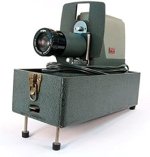When it comes to the world of home entertainment, the rise of sleek, ultra-modern projectors has led many to overlook the charm of more traditional designs. Enter the Argus Slide Projector (Type I). It’s portable, offers high-definition video quality, and boasts a surprisingly compact size—yet, it begs the question: Can a device anchored in nostalgia really compete with today's advanced technology?
In this review, we'll explore whether this retro-inspired projector can truly enhance your cinematic experience or if it's just a relic of the past masquerading as a contemporary gadget. Is the allure of its portability and ease of use worth the investment, or is it simply a shiny distraction in an age dominated by digital perfection? Let's dive into the features, the benefits, and the potential downsides of the Argus Slide Projector to find out if it deserves a place in your home cinema setup.
Hey everyone.
I'm considering the Argus Slide Projector (Type I) for some home movie nights and would love to get your thoughts on it. I've heard it boasts high definition video quality, which is a major plus for me, but how does it actually perform in real-life settings? Is the picture quality as impressive as advertised, or are there any limitations I should be aware of?
Also, what about the sound quality? Is it sufficient for a cinematic experience, or would I need to invest in external speakers to get the best out of it?
I've seen that it has a portable design and a lightweight build, which is great for moving it around. How easy is it to set up, and does it really work well on a variety of surfaces?
Lastly, are there any potential downsides or common issues that I should keep in mind before making a purchase?
Thanks for your insights!
In this review, we'll explore whether this retro-inspired projector can truly enhance your cinematic experience or if it's just a relic of the past masquerading as a contemporary gadget. Is the allure of its portability and ease of use worth the investment, or is it simply a shiny distraction in an age dominated by digital perfection? Let's dive into the features, the benefits, and the potential downsides of the Argus Slide Projector to find out if it deserves a place in your home cinema setup.
Spec
| Parameter | Argus Type I Projector |
|---|---|
Picture | |
Reference Price | $115.99 |
Recommended Uses | Home Cinema |
Built-In Media | Power Cord, Remote (possibly), Carrying Bag (possibly) |
Highlight | Portable Design: The Argus Slide Projector has a portable form factor that makes it easy to transport and set up. High Definition: The projector provides high definition video quality for an immersive home cinema experience. Versatile Mounting: The tabletop mount allows the projector to be placed on any flat surface for optimal viewing. Easy Control: The button control allows for simple and intuitive operation of the projector. Compact Size: With a weight of only 15 pounds, the Argus Slide Projector is lightweight and easy to handle. |
Contrast Ratio | 1000:1 to 2000:1 |
Maximum Resolution | 1920 x 1080 |
Native Resolution | 800 x 600 |
Brightness | 2500 lumen |
Display Type | LCD |
Video Encoding | H.264 or H.265 |
Controller Type | Button Control |
Control Method | Touch |
Connectivity Technology | VGA |
Hardware Connectivity | VGA |
Compatible Devices | Laptop, Television, Gaming Console, Smartphone |
Other Features | Portable, Lightweight |
Item Weight | 15 Pounds |
I'm considering the Argus Slide Projector (Type I) for some home movie nights and would love to get your thoughts on it. I've heard it boasts high definition video quality, which is a major plus for me, but how does it actually perform in real-life settings? Is the picture quality as impressive as advertised, or are there any limitations I should be aware of?
Also, what about the sound quality? Is it sufficient for a cinematic experience, or would I need to invest in external speakers to get the best out of it?
I've seen that it has a portable design and a lightweight build, which is great for moving it around. How easy is it to set up, and does it really work well on a variety of surfaces?
Lastly, are there any potential downsides or common issues that I should keep in mind before making a purchase?
Thanks for your insights!




